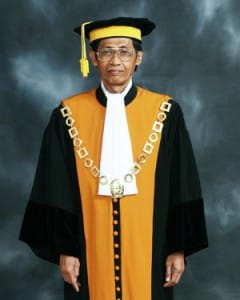It is often said the Indonesian judiciary is rotten to the core. But there is one Supreme Court judge who always upholds or extends the sentences of corruption felons, and sides with the poor.
That judge is Artidjo Alkostar. To anti-graft activists, he is a hero. In more than a dozen corruption cases appealed to the Supreme Court, he has upheld guilty verdicts or overturned acquittals.
For example, Artidjo led a panel of three Supreme Court judges that in November 2013 increased the sentence of former legislator Angelina Sondakh from four years and six months behind bars to 12 years for accepting bribes to rig government contracts.
He also extended the jail sentence of former Democratic Party chairman Anas Urbaningrum from seven years to 14 years for corruption and money laundering.
Even the biggest names don’t inspire fear. After former president Suharto was charged with corruption in 2000, Artidjo was on the panel of three Supreme Court judges handling his appeal. Two of the judges wanted to drop the case, but Artidjo issued a dissenting opinion, resulting in a compromise that Suharto would remain a suspect and be tried when healthy. Suharto never was brought to court and died in 2008.
Artidjo has a reputation for siding with the ‘little people’. In 2011, the Supreme Court sentenced an elderly domestic worker, Rasminah, to four months and 10 days in jail for stealing six plates, an oxtail, mouthwash and other items from her employer in Ciputat, west of Jakarta. Artidjo issued a dissenting opinion, declaring she was not guilty.
In October 2006, when the Supreme Court overturned the conviction of Garuda Indonesia pilot Pollycarpus Budihari Priyanto for the murder of human rights activist Munir, Artidjo issued a dissenting opinion, demanding life imprisonment for the pilot.
Artidjo also champions environmental cases. In 2008, he was on a panel of Supreme Court judges that overturned Medan District Court’s acquittal of timber tycoon Adelin Lis on corruption and illegal logging charges.
To the political elite, Artidjo’s determination to punish corruptors has earned him unflattering nicknames, such as “the crazy judge” and “the killer judge”.
Fierce Determination
Artidjo was born in 1949 in the East Java town of Situbondo. His mother was from Sumenep on the island of Madura, where people have a reputation for being fiercely determined.
His career in law came about by accident. After completing high school, he wanted to study agriculture because his father was a farmer (and a religious teacher). Artidjo entrusted an acquaintance to enrol him in the Faculty of Agriculture at the Islamic University of Indonesia (UII) in Jogjakarta. Upon arriving for the entrance exam, he was informed that Agriculture enrolments had closed, so he enrolled in Law, intending to transfer to Agriculture the following year. He ended up enjoying Law and stuck with it.
After graduating in 1976, he considered becoming a state prosecutor, before deciding to be a lawyer. In 1981, he was appointed deputy director of the Legal Aid Institute (LBH) office in Jogjakarta. In 1983 he became director of the office, a position he held until 1989. His early years with LBH coincided with the so-called ‘mysterious shootings’ in which the military from 1983-85 killed thousands of alleged hoodlums without trial and left their bodies in the streets as part of an effort to combat crime. Artidjo protected some of the people on the hit-list, letting one gangster stay at his house for three months. In several cases, he confronted the military. There were rumours that Artidjo would be killed for his boldness.
In 1989, Artidjo went to New York and studied human rights law at Columbia University. He also worked for the Asia division of Human Rights Watch in New York for two years. Coming home, he established a legal practice, Artidjo Alkostar and Associates.
In November 1991, the Indonesian military massacred over 250 unarmed East Timorese at a cemetery in Dili. After the bloodbath, Artidjo and another lawyer went to East Timor to defend two pro-independence activists on subversion charges. The lawyers faced many threats from military intelligence agents. The presiding judge initially refused to allow them to represent the defendants, who were sentenced to 15 years and life imprisonment. Artidjo was subsequently commended for his “commitment to the ideals of justice and human rights in the face of threats, intimidation and obstruction”.
Dark Justice
In 2000, then-justice minister Yusril Ihza Mahendra informed Artidjo he had been nominated to become a Supreme Court judge – at a time when the government was trying to clean up the top court by appointing non-career judges.
Artidjo initially declined. “Because I knew the world of justice was black … because there are often bribes. I knew this from my experience as a lawyer,” he said.
Yusril assured him that he had been nominated by human rights activists and reformists. So Artidjo consulted with Muslim clerics from Madura, who advised him to accept. After undergoing a “fit and proper test” he was installed as a judge.
Within two months of joining the Supreme Court, he put a notice on his office door that read, “No visitors who want to talk about cases,” because many people were trying to bribe him for favourable verdicts.
He said one acquaintance offered him cash, a car and an apartment. Another time, a businessman from the East Java capital of Surabaya came to his office and announced: “Mr Artidjo, here’s the money, the others [judges] already have theirs.”
As a judge, Artidjo should have received an official residence in Jakarta, but he ended up renting a modest house behind a welding workshop in the unfashionable neighbourhood of Kramat Kwitang because a retired judge refused to vacate his free house. Artidjo turned heads at the Supreme Court because he often arrived at work in a bajaj. On most Fridays, he still flies to Jogjakarta (where his wife lives) and on Saturdays lectures in law at his alma mater, UII.
While many judges live in opulence well beyond their official salaries, Artidjo’s only luxuries are his collections of ornamental carp and bonsai plants. He is also a voracious reader, enjoying crime fiction and philosophy.
Bantleman & Tjiong
On May 22, Artidjo will turn 67. Supreme Court judges used to have to retire at 65, but in 2009 their retirement age was extended to 70.
If Artidjo had retired at 65, he would not have led the panel of three judges who on February 24 overturned Jakarta High Court’s acquittal of two Jakarta Intercultural School (JIS) teachers, Canadian Neil Bantleman and Indonesian Ferdinant Tjiong, on charges of sexually abusing three kindergarten boys. The teachers had initially been convicted by South Jakarta District Court and sentenced to 10 years. Artidjo extended their sentence to 11 years.
Many of Jakarta’s expatriates believe the abuse case was baseless and financially motivated. The mother behind the charges, who has since moved to Belgium, insists her son was gang-raped multiple times in a toilet, and also in Bantleman’s glass-walled office and in “a secret room” in the teachers’ lounge – and that a magic stone and magic potion were involved. She initially tried to sue JIS for US$12.5 million and blamed the alleged abuse on six cleaners, one of whom died after brutal police interrogation. The others say they were tortured into making confessions.
When the mother could not get any compensation because JIS had no liability for the cleaners, she declared the teachers were also involved in the abuse and increased her demand to US$125 million. She maintains her son contracted herpes as a result of sodomy, but an independent lab test conducted in Europe showed the boy does not have the virus.
Despite the flimsy evidence, the court of public opinion was firmly against JIS, which is one of the country’s most expensive schools. Lawyer Hotman Paris Hutapea says judges are often reluctant to issue verdicts contrary to public opinion. “They have to do it to save their job; they have to do it to get the sympathy of the public,” he told Canada’s CBC News.
Artidjo, as usual, sided with the public, perhaps keen to show that foreign pressure could not influence the Indonesian judiciary. Or perhaps he was in a hurry – the prosecution had requested the verdict be made before a travel ban on Bantleman expired. Reports say the panel of judges was named only on February 22 and then issued the ruling two days later – hardly sufficient time.
When foreign paedophiles are tried in Indonesia, their countries generally don’t insist upon their innocence.
Given the irregularities and lack of evidence against Bantleman and Tjiong, it seems that Artidjo’s habitual heroism may have led to a rushed, flawed verdict.
Miscarriages of justice, no matter how well-intentioned, are just as bad as judicial scams of buying and selling verdicts. Meanwhile, the mainstream Indonesian media has lavished praise upon the Supreme Court for maintaining the credibility of the legal system.




